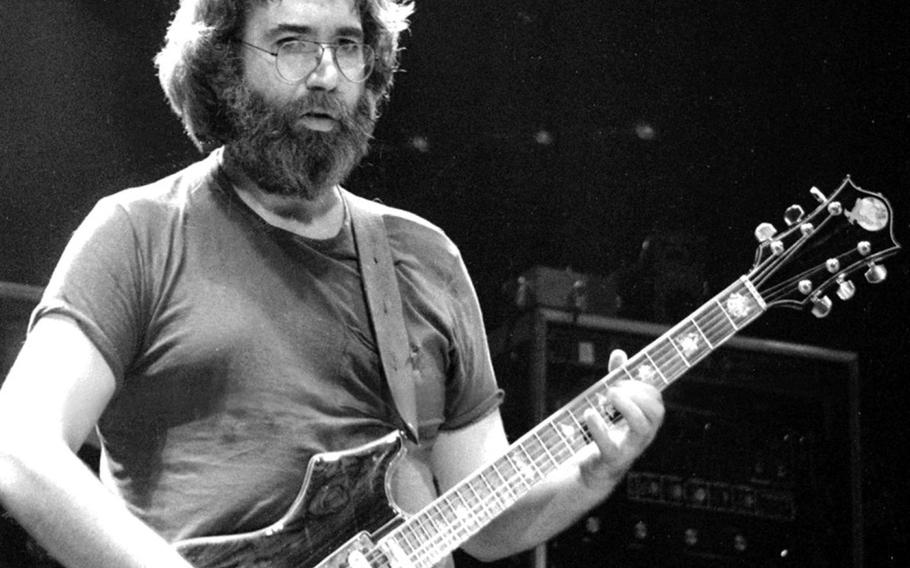
Jerry Garcia plays during the Grateful Dead's European tour stop at the Walter Koebel Halle, in Ruesselsheim, Germany, Oct. 1981. Garcia joined the Army in April 1960, but received a general discharge just nine months later. (Stars and Stripes)
Recruit Jerome J. Garcia’s staunch resistance to the strictures of military life six decades ago got him discharged just months into his enlistment.
Five years later, he founded the Grateful Dead and Jerry Garcia would go on to be the namesake of both a pot brand and an ice cream flavor.
It may seem obvious in retrospect that the founder of one of the biggest psychedelic rock jam bands of the 1960s wouldn't have been cut out to serve “the man,” and his commanding officer made that clear in a December 1960 discharge recommendation.
“Garcia has steadfastly maintained a defective attitude toward superiors, authority, and military life in general,” wrote Capt. John H. Downey of the 30th Artillery Group (Air Defense) headquarters battery at Fort Winfield Scott at the Presidio of San Francisco.
The legendary musician’s official military personnel file came to the attention of fans and music publications after Eric Schwartz, host of the Lone Star Dead program on Dallas radio station KNON, posted images from it to social media this year. Digital scans have been available on the National Archives website since November 2016 and have been considered public record since August 2005, 10 years after Garcia’s death, archives spokeswoman Laura Sheehan told Stars and Stripes by email earlier this year.
The files show Garcia didn't make a good first impression on the battery's 1st Sgt. Walter L. Heller, either.
“During the first two weeks of his assignment here, Garcia came to my attention because of his personal uncleanliness and the filthy condition of his personal billeting area in the barracks,” Heller wrote in a formal statement.
An Army psychiatric evaluation determined Garcia was emotionally unstable and held an “intense hostility towards [the] regimentation of the Army.”
Born in San Francisco in 1942, he was raised in the Bay Area, at least partly by his grandmother, he told Rolling Stone in a 1972 interview, describing how he'd played music from a young age with his brother who would go on to serve four years in the Marines.
Garcia began experimenting with pot when he was 15, the same year he got his first electric guitar, he told the magazine. About two years later, things at home weren’t “working out” and he dropped out of high school, looking to the military as the only option to “get away from everything.”
“Yeah, 17. I joined the Army, smuggled my guitar in,” he said. “I just wanted to be some place completely different.”
But the Army didn’t end up taking him all that far from where he’d grown up, and he didn't serve anything near to the three years he signed up for in April 1960.
“I lasted nine months,” he told Rolling Stone. “They transferred me to the Presidio in San Francisco … a beautiful, lovely spot … overlooking the water and the Golden Gate Bridge and all that and these old barracks and almost nothing to do.”
After arriving in August, he got into the acoustic guitar — and into trouble.
In the span of a couple months, he racked up three NJPs — including one for willful disobedience and two for going AWOL — and a summary court-martial for breaking restriction, which got him busted from private plus 30 days’ hard labor and $50 docked pay, records show.
When counseled, he told his leaders he didn’t plan on shaping up.
“I have found Garcia to be unreliable, irresponsible, immature, unwilling to accept authority, and completely lacking in soldierly qualities,” Downey wrote. “Garcia’s only interest appears to be getting out of the Army. He shows no interest in any function connected with the military.”
Capt. Levin F. Magruder, an Army psychiatrist, found him to be a “soft spoken, pleasant young man” who lacked “motivation for compliance with the rules and regulations that did not fit into his personal code of right and wrong,” his evaluation shows. It was nothing the Army could fix, Magruder wrote.
After receiving a general discharge, Garcia went to Palo Alto, where he befriended fellow Army veteran Robert Hunter, who would later write lyrics for the Dead. Both were living out of broken down cars in an empty lot, he told Rolling Stone.
“Hunter had these big tins of crushed pineapple that he’d gotten from the Army … and I had this glove compartment full of plastic spoons, and we had this little cooperative scene eating this crushed pineapple day after day and sleeping in the cars and walking around,” he said.
After a few years of playing in coffee houses and giving lessons at a music store, he formed a jug band with Ron “Pigpen” McKernan, Bob Weir and Bill Kreutzman. They later added Phil Lesh and began calling themselves the Warlocks.
They attended the first public Acid Test convened by author Ken Kesey and the Merry Pranksters in November 1965, exactly five years since Garcia’s second AWOL incident. They debuted as the Grateful Dead a week later at another of the weekly LSD-fueled events.
Garcia’s resistance to the military’s rigidity seems characteristic of the group's musical free-spiritedness.
“The Dead has always been about more than Rock and Roll, about artistic curiosity and freedom,” Bruce Hornsby said during the band’s 1994 Rock & Roll Hall of Fame induction. “These guys have truly always gone their own way.”
Just as Garcia had gone AWOL from the Army a few times, he skipped the induction ceremony to the rock and roll pantheon. He died the following year of a heart attack in a rehab clinic, days after turning 53.
garland.chad@stripes.com Twitter: @chadgarland